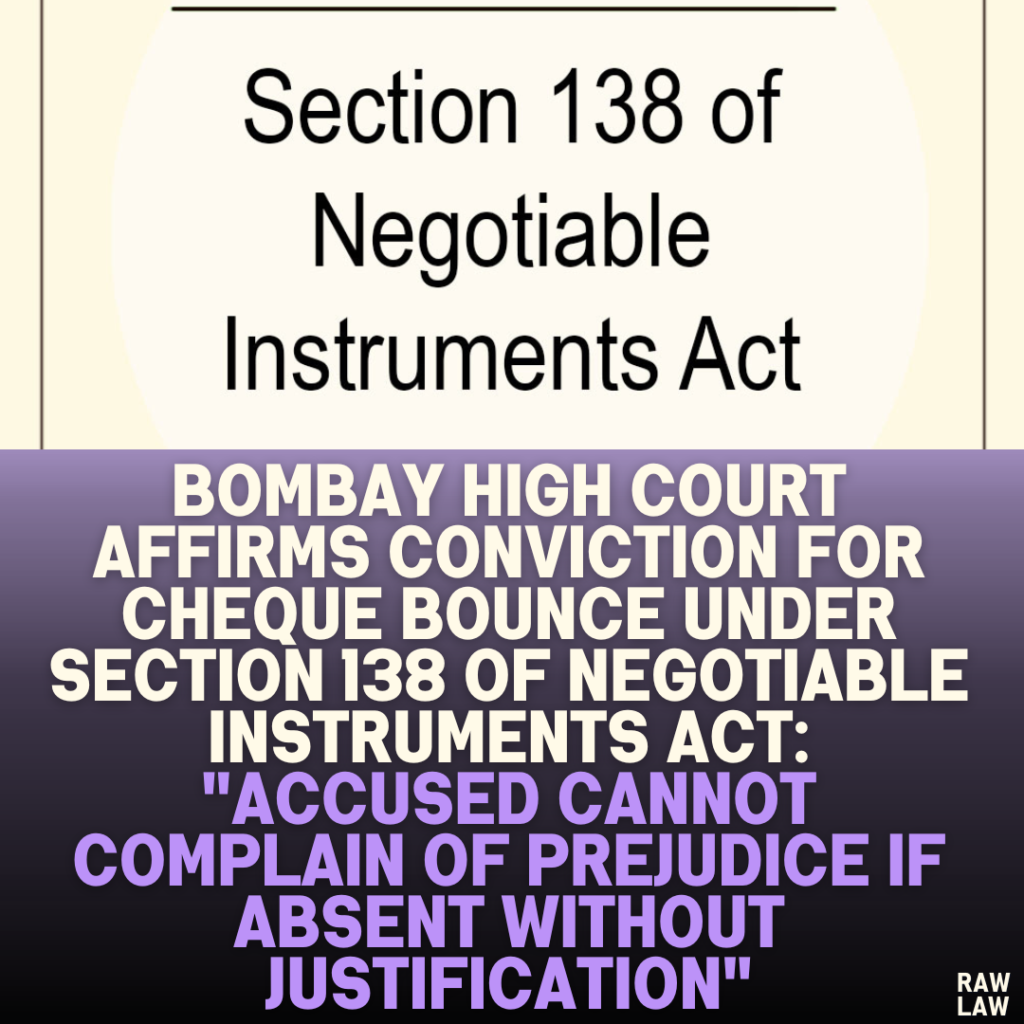Court’s Decision
The Bombay High Court dismissed two revision applications filed by the accused and upheld the conviction under Section 138 of the Negotiable Instruments Act (NI Act). The accused were sentenced to:
- One year of simple imprisonment for each of the cheque bounce cases.
- Payment of a fine amounting to twice the cheque value (Rs. 2 crore), with an interest of 9% per annum until realization, payable as compensation to the complainant.
The court found that the accused consistently failed to appear during trial without providing valid reasons, which justified the trial court’s decision to proceed in their absence and without recording their statements under Section 313 of the Criminal Procedure Code (CrPC).
Facts of the Case
- Background: The complainant filed two summary complaints under Section 138 of the NI Act, alleging that two cheques (each for Rs. 50 lakh) issued by the accused to discharge a hand loan were dishonored due to account blockage.
- Trial Court Proceedings:
- The accused initially appeared in court, furnished bail, and their plea was recorded.
- Subsequently, the accused and their advocates failed to attend further proceedings.
- The complainant submitted evidence through an affidavit and closed the case after no cross-examination occurred.
- The trial court convicted the accused in their absence and imposed penalties as outlined above.
- Appellate Court’s Findings: On appeal, the Additional Sessions Court upheld the trial court’s findings, emphasizing that:
- The accused failed to rebut the presumption of liability under Section 139 of the NI Act.
- They did not appear during trial or provide cogent reasons for their absence.
- Revisions Filed: The accused filed revisions before the Bombay High Court, claiming procedural violations, particularly the failure to record their statements under Section 313 of CrPC.
Issues for Consideration
- Can the trial court proceed in the absence of the accused if they fail to attend the proceedings without valid justification?
- Is the recording of statements under Section 313 of the CrPC mandatory in such circumstances?
- Does the absence of cross-examination prejudice the rights of the accused?
Petitioner’s Arguments
The accused contended that:
- The trial court erred in proceeding with the trial in their absence, which violated principles of natural justice.
- The non-recording of their Section 313 statements prevented them from explaining the evidence against them, causing significant prejudice.
- The complainant did not take adequate steps to secure their presence or assist the court in recording their statements.
Respondent’s Arguments
The complainant argued that:
- The accused consistently absented themselves from the trial and failed to exercise their right to cross-examine the evidence submitted.
- The legislative intent behind the NI Act emphasizes the need for expeditious disposal of cheque bounce cases.
- Procedural safeguards under Section 313 of CrPC were not intended to be abused by the accused to delay justice.
Analysis of the Law
- Provisions of the NI Act:
- Section 138: Establishes criminal liability for cheque dishonor, mandating penalties to ensure the credibility of banking transactions.
- Section 139: Presumes liability on the part of the accused unless rebutted through evidence.
- Section 143: Allows for summary trials to ensure the swift resolution of cheque bounce cases.
- CrPC Provisions:
- Section 313: Requires the accused to be given an opportunity to explain incriminating evidence. However, it also allows flexibility in recording such statements based on the facts and circumstances of each case.
- Section 273: Mandates that evidence should be recorded in the presence of the accused unless they are absent with valid justification.
- Case Law and Precedents:
- In Prakash Chimanlal Sheth v. T. Ramalingam Nadar, the Bombay High Court held that a trial court can proceed without recording Section 313 statements if the accused is absent and fails to justify their absence.
- In TGN Kumar v. State of Kerala, the Supreme Court emphasized that procedural safeguards in NI Act cases should not be misused to delay proceedings.
- The High Court of Karnataka, in R. V. Kulkarni v. Dakshina Murthy, deprecated accused persons who habitually absented themselves during trials, holding that such conduct should not obstruct justice.
Precedent Analysis
The court reviewed and applied the above precedents to conclude that procedural requirements like Section 313 of CrPC must be interpreted in light of the NI Act’s purpose, which is to provide swift and effective remedies for cheque dishonor. It also highlighted that courts have discretion in managing procedural requirements to prevent misuse by the accused.
Court’s Reasoning
- Absence of the Accused:
- The court noted that the accused failed to appear on multiple occasions despite repeated notices and the issuance of bailable warrants.
- This persistent absence amounted to a waiver of their rights to cross-examine the complainant or respond to the evidence.
- Recording Section 313 Statements:
- The court reasoned that recording such statements is primarily intended to benefit the accused by allowing them to explain incriminating evidence.
- However, when the accused deliberately avoids proceedings, the trial court is justified in dispensing with the requirement, as the accused cannot claim prejudice arising from their own conduct.
- Balancing Justice and Procedural Flexibility:
- Emphasizing the quasi-criminal nature of Section 138 cases, the court stated that procedural safeguards cannot be exploited by the accused to frustrate the purpose of the NI Act.
Conclusion
The High Court concluded that:
- The trial magistrate acted within their discretion by proceeding with the trial and convicting the accused despite their absence.
- The appellate court rightly upheld the conviction, as the accused failed to rebut the statutory presumption under Section 139 of the NI Act.
Implications
This judgment sets a clear precedent that procedural safeguards under the CrPC, such as recording statements under Section 313, must be applied pragmatically in cases under the NI Act. It underscores that accused individuals cannot evade justice by remaining absent and that courts must prioritize the rights of complainants to seek timely remedies.
